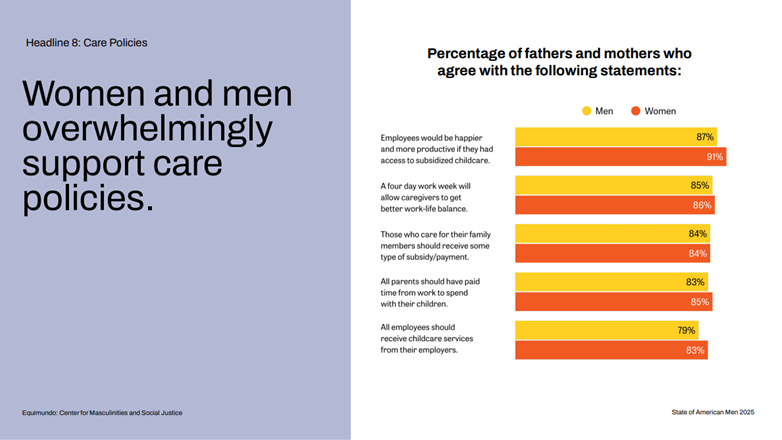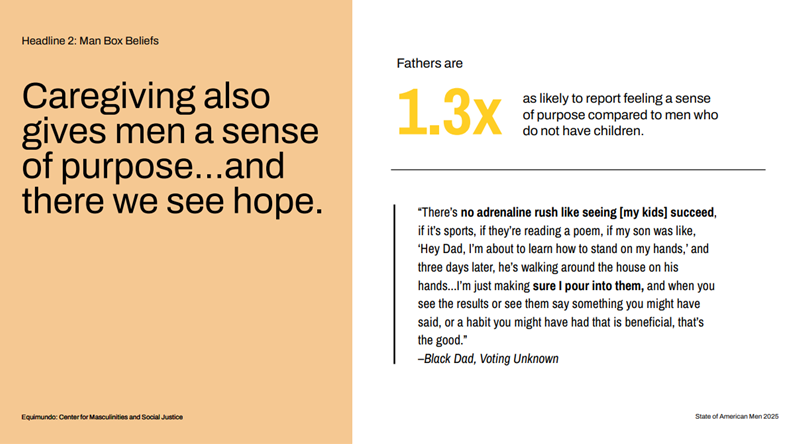Reimagining Manhood: A Path Forward from the State of American Men Report
- Allan Shedlin

- Aug 5, 2025
- 5 min read
Guest post by Dr. Taveeshi Gupta
Senior Director of Research at Equimundo, a D3F Circle of Friends Member

At Equimundo, our work is rooted in the belief that transforming masculinity is essential to building a more just, equitable, and caring world. Our recently released State of American Men 2025 report paints a stark but ultimately hopeful picture: While men in the United States are facing unprecedented economic, social, and emotional strain, they are also hungry for connection, purpose, and care. The path forward lies in supporting men not in reclaiming outdated ideals, but in building new ones – rooted in equality, compassion, and a shared humanity.
Men Are Not OK
In our research with more than 2,400 respondents and 32 in-depth interviews with fathers across the country, one message came through loud and clear: American men (and women) are struggling. For men, this is particularly challenging because they are overwhelmed by economic instability and yet feel like they are failing in what society still deems their most essential role – being a provider. And the pressure to be a provider in this complicated world isn't abstract nor is it a linear path to financial success. It seeps into their mental health, relationships, and sense of self-worth.

Men who experience financial instability are 16 times more likely to report recent suicidal ideation. Many feel like "wallet dads," present financially but emotionally disconnected, and they wish it was different. These pressures do not fall along partisan lines. Fathers across backgrounds from all over the United States voiced the same concerns. They want to be there for their kids, but they are exhausted.
And this dissonance is felt both inward and outward. Disconnected from meaningful relationships and feeling unseen, some men seek solace in online spaces that reinforce zero-sum thinking, misogyny, and authoritarian politics. At Equimundo, we see this as a symptom of the problem, not a failing of the individual. And we must address the root drivers of the disconnection – and hold some individuals accountable parallelly – for a positive change in the world.

Men Need Connection
Our findings reflect what the U.S. Surgeon General has called an epidemic of loneliness. More than half of men report feeling like no one really knows them. Younger men, in particular, feel unworthy of love and deeply pessimistic about their romantic prospects. This isolation is not just social, it's existential.
Women agree – no one cares that men are OK. And, of course, men overwhelmingly agree. When half the population speaks up and says that they feel unloved, not valued, and isolated, we must listen and step into this with compassion, no matter how hard it feels. And we must ask: what are we doing, as a society, to help men (and boys) be not just providers or protectors, but complex, feeling humans who need care, connection, and community like all humans do?

Solutions Start with Care
The good news is that there are solutions that center on leaning into what already brings men purpose and connection – caregiving, mentorship, and emotional expression.
1. Support Men as Caregivers.
Men find real meaning in caregiving. Fathers are 1.3 times more likely to report a sense of purpose than non-fathers. Supporting men in this role through paid leave, child tax credits, and flexible work is not just good policy; it's a mental health intervention.
2. Engage Boys Early.
Rigid gender norms take root early. That's why our work through the Global Boyhood Initiative fosters aspirational, inclusive visions of manhood from the start. We need to create spaces where boys can express emotions, seek help, and dream of being more than tough or strong.
3. Invest in Mentorship and Coaching.
Young men need guidance. They don't need warnings about what not to do, but models of what healthy masculinity can look like. Programs that offer apprenticeships, mental health support, and community can create transformative change.
4. Transform Online Narratives.
We must not cede digital spaces to harmful ideologies. Through initiatives like the LinkUp Lab, we are working with our partner, Futures Without Violence, with influencers and content creators to tell stories of connection, care, and growth. Men go online to find advice, community, and meaning so let's give them better options.
5. Prioritize Economic Dignity.
Finally, we must acknowledge that economic stress is not a personal failing, it is a structural crisis. Policymakers at all levels must prioritize economic security, especially for working-class men. When we address systemic inequality, we create the conditions for healthier masculinities.
Moving from "Man Up" to "Link Up"
This moment is not just about men. It's about all of us. Restrictive masculinity hurts women, LGBTQ+ individuals, and men alike. But when men feel empowered to care, to connect, and to show up differently, the ripple effects benefit everyone.
As we write in the State of American Men report:
"This is the time for us to recognize why we are seeing pushback on equality and rights and collectively acknowledge and address the structural drivers of these rollbacks."
GRAPHICS: Equimundo's State of American Men 2025 report
If we want a future where our sons are both strong and nurturing, where our daughters are safe and free, and where all of us can thrive, then we must take this work seriously.
Let's build a version of manhood that heals, not harms.
Daddying Film Fest 2026

The 5th annual Daddying Film Festival & Forum (D3F) welcomes film and video submissions, including TikToks and Instagram reels, from students (3rd-graders through undergraduates), Dads/Granddads, Dad figures, and indie filmmakers worldwide! Dads/Granddads, Dad figures, and students can submit videos/films for FREE on D3F's FilmFreeway page through Friday, Oct 3, 2025. Regular entry deadline is Monday, December 8.
And DC-region student and Dad singers, rappers, bands, choirs, dancers, and poetry slammers, don't forget this year's NEW Daddying Film Forum Opening Acts Contest! We're hosting a music, poetry, and dance video competition to choose opening acts that will perform live at the 4th annual Daddying Film Forum in Washington, DC, January 30-31, 2026. The contest is open to local DC, Maryland, and Virginia students, Dads/Dad figures, and Granddads across a range of musical, spoken-word, and dance performance categories. Contest entries are FREE* but must be submitted no later than October 3, 2025.
Not from the DMV? No problem! Even if you're not located in DC, MD, or VA, we'd love for you to create/submit a daddying-related music/dance video for D3F 2026 consideration, and all student and Dad/Granddad/Dad figure entries are still FREE if submitted by October 3, 2025. Students/Dads/Dad figures will still be eligible to earn Atticus Awards and prize money in their respective award categories! Check D3F's website for more details.
*NOTE to choir/dance directors, teachers, and other adults submitting videos on behalf of their students: Please submit contest videos on FilmFreeway as "student" submissions to ensure properly qualified as FREE entries.

Dr. Taveeshi Gupta is an expert on gender having spent the last 15 years conducting global research on constructions of masculinities and gender – its impact on young people and the role of structural inequalities and barriers to healthy and positive human development for all. Taveeshi has been published widely and has been featured in a variety of media outlets such as The Guardian, NPR, The Globe and Mail, Chief, and Nation Africa. She has served as an expert adviser on this topic at UN Women, UNFPA Sri Lanka, UNESCO, Movember, OECD, and APEC to name a few. Taveeshi is also on the Scientific Advisory Committee for the Lancet Commission on Violence against Women and Girls. At Equimundo, in her current role as Senior Director of Research, she leads and manages the global research portfolio. Taveeshi has a BA and MA in Psychology from University of Delhi, and a PhD in Developmental Psychology from New York University.














Comments